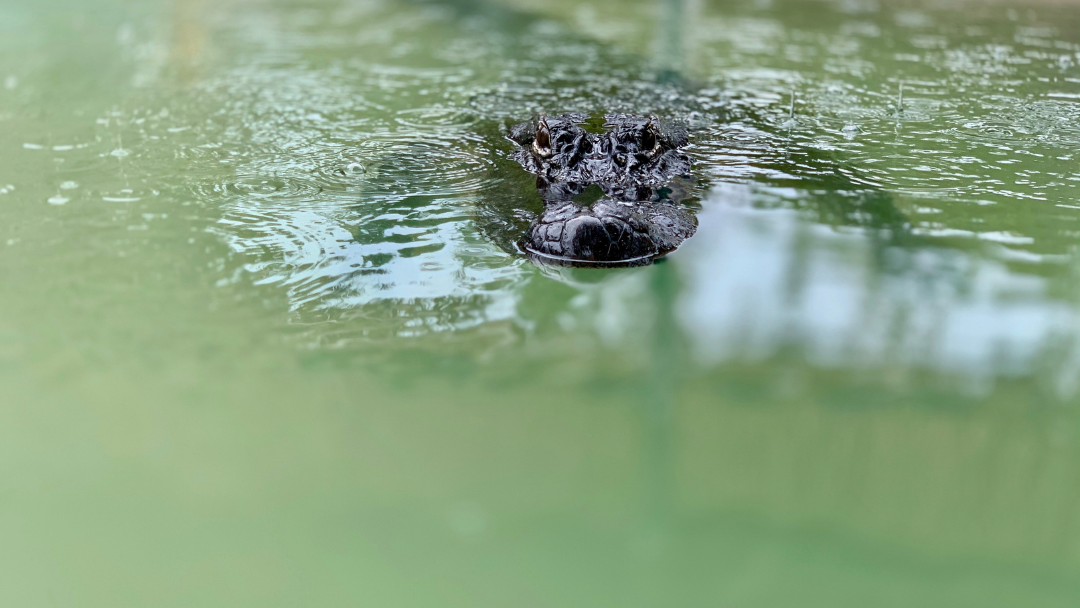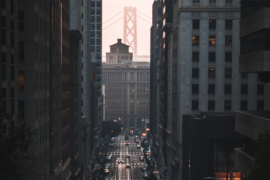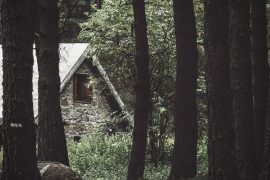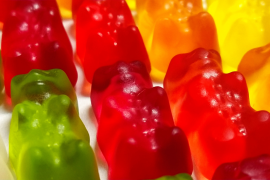THE RAINS CAME TWO YEARS AGO, AND THEY HAVEN’T STOPPED SINCE. Some said it was global warming like everything else, from high tides to broken sinks, but the 2028 report said the arctic was unchanged, and the penguins were happier than ever. It just rained. Constantly. Like Heaven itself was covering us with wet blankets to stifle our hellishness.
It’s raining on me, my dog, my surroundings, as if this skeleton of a city could use more water. Water sloshes at my waist. Sweat makes my galoshes stick and chafe, but they squeeze my knees to keep water out, and I hate a wet shoe. Almost as much as the perpetual humidity.
I remember my history books, back when they didn’t have to be laminated and schools weren’t on boats. They talked about Florida before the Spaniards. How everything was swamp, far as you could see. I guess this is what we get for trying to turn her into another New York City. Not that they’re any better now, after electricity was banned for conservation.
I pass the Tampa courthouses and administration buildings. Carved, art-deco faces on door frames peek out, marble skin now green like strange mermaids or swamp witches. Borzoi sloshes ahead. His tail drags through the water like a rudder. With dark fur soaked, he looks skinnier than he already is, a living shadow among sculpted swamp ghouls.
In the courthouse park, what was grass is now a field of algae. A siege of herons stand watch under the gazebo, whether for us or fish, I don’t know. Their white feathers stand out in this green and brown landscape, like ghosts of another world. It’s their town now, so maybe we’re ghosts to them. The sight is comforting; herons mean no gators ready to make a late lunch of me and my dog.
Miraculously, the clock in the ex-park still works. It rises from the water with moons of another architectural age. 2:53 – too early for gator activity. We have to meet Sammy at 3:00 if we want the boat. With it, given I can paddle hard enough, we should be home before 4:00—gatortime.
I need the boat to scavenge and hunt faster. Faster means more food and more food means less expeditions, maybe enough for us to dry out. I don’t remember the last time my hair wasn’t damp. Passing a window, my reflection sneaking out from steamed glass, I’m reminded how bad it looks. I don’t look like much of woman anymore. I’m as swamp as the herons and carvings and Borzoi, with rain-hair and a poncho that obscures any semblance of form. Not that anybody’s left to impress or that I want to. This boat will help more than any human. Sammy’s the first person we’ll have seen in a month, and he’s got no looks to brag about either.
Sammy used to live in the middle of nowhere, though he won’t tell me since “nowhere’s everywhere now.” He ran a shop and won’t say what kind. Probably some pawn shop. He does the same thing now, except he’s taken up an old yacht and sells to survivors who stay because they have no money to leave or they know there’s no place better off. Everyone needs Sammy. He’d be a millionaire by now if he charged cash and if paper money held up here. But Sammy’s an introvert, like the rest of us. No one who likes company stays here.
My company is Borzoi. Last month, he caught a cold. I had to use up half my fire starter and carry him around under my poncho. Some might’ve seen it as a blessing. A dog takes more provisions and attracts gators, so I could’ve let him go. But he’s company when I think the rain’s driving me insane. Even if I’m crazy already, at least I’m not crazy alone.
Of course, crazy is a yacht careening down the Selmon Expressway and swinging around the waterslide of a ramp.
“All aboard!” Sammy appears on the starboard side, rope ladder in hand. Climbing it with Borzoi is near impossible, but that’s not a word I keep in my back pocket. You can’t if you still live in Florida.
“It’s been a while, Liza.” Sammy’s stringy hair is long, barely held together in a bun. His eyes are different colors, green on the right and brown on the left, and with his teeth jagged, he whistles his S’s like a harmonica.
“Wouldn’t be so long if you didn’t cruise the state for months.”
He shrugs. “It’s a life. I wanna sail straight off the coast next. Visit Cuba. You think cigars would sell here?”
“Not in this humidity.”
We wander inside as he prattles about “foreign exports” he wants to start selling. I hope he doesn’t take off on this idea. I’d hate yet another month between store visits.
You could forget you’re on a boat in Sammy’s store. Miscellaneous objects block the windows: plastic Christmas trees, wooden fences, camping chairs, and more. It’s a mobile landfill, yet somehow Sammy knows where everything is. Even more surprising is that he makes a profit off this garbage. People will take anything during desperate times.
“Whadaya got for the boat?” he asks.
“Ten packs of gum.”
I put them on a table. The brand name Stride is a skeleton, and the last pack is missing a piece. I couldn’t help myself. The fifth container is smashed like someone stepped on it, and the eighth has Borzoi’s teeth marks imprinted. Sammy runs his tongue over chapped lips. The green eye glimmers, reflects the color of the gum packs.
“Where’d you get these?”
“My place. I hid them a while ago.”
He makes a big show of inspecting each pack, opening them up, humming when he sees a piece missing. I curse my gluttony. The few minutes of spearmint flavor bursting in my mouth like a firework wasn’t worth not getting the boat.
Sammy hums some more, then whistles through his teeth. Not good. I clench my teeth to keep them from chattering, half from cold, half from nerves. We need the boat. And I didn’t waste a perfectly good orange paying for a message to Sammy just for him to turn me down.
“Damaged products get damaged products,” Sammy concludes. “And you don’t want a damaged boat.”
I frown, will myself not to turn red. “You know gum is rare these days. Anyone would want it.”
He shakes his head. “What else you got?”
There it is, the question I’d hoped to avoid. Nothing else is in my bag but humid air and an empty can of pepper spray from two years ago. My gaze shifts behind Sammy. If we could find the boat, we could try to take it, but I doubt I could carry it by myself, and that’d be the end of any visits from Sammy. You don’t make an enemy of the boat that supplies you. I have to barter. My least favorite kind of deal too – one where there’s no backup.
“That’s it.” I keep my voice steady somehow. “I’m not paying more.”
“Then no boat.”
“Fine. It probably has a hole anyway. Good luck selling it.”
I walk away, Borzoi trudging behind. We pass watering cans, a decrepit teddy bear, some canned beans, and an old refrigerator. My ears grow hot, and I offer a silent prayer that Sammy will change his mind. If nothing else, I doubt we can get home before gatortime without the boat. I can almost smell the blood-water.
“Hold it,” Sammy calls.
I don’t turn back, hoping not to seem too eager, knowing I have nothing if he proposes another deal.
“People love gum,” he concedes.
The new boat seems to appear from nowhere as Sammy drags it out. It’s fiberglass, bright red. I hope the flashy canoe doesn’t attract gators.
“Do I get the paddle too?”
Sammy smirks, crooked as his teeth and his business. “This time. For my special customer.”
Getting the canoe off Sammy’s boat takes longer than I expect. We do a lot of yelling as the sky weeps on us. When we finally ease it down, a shadow in the water makes me check a digital clock sitting on Sammy’s shelf – 3:45. Not good.
“You wanna wait it out?” Sammy seems to have read my mind, but I’d never admit it. If he thought he had telepathy or whatever, he’d start charging people for his “services.”
“You could leave in the morning,” he continues. “I won’t charge for the stay.”
It’s tempting. The water stirs below, and I know it’s not just rain. But I don’t want Sammy thinking I can’t handle things. I’ve spent the past two years proving I was worth his time. In this world of survival, the appearance of it is as important as surviving. Those who need help get taken advantage of. And I don’t get taken advantage of.
“No. We’re going.”
Borzoi whines.
“You sure?”
A look silences him. Soon, we’re looking up at him from our canoe, and I’m wishing I had ten thousand gum packs to buy a yacht of my own.
#
The courthouse clock reads 4:00. I don’t like this. I’m jumpy. It’s bad to be out during gatortime, worse to be nervous about it. Shaking nerves dull the wits, and with dulled wits, telling the difference between inland driftwood and a gator is impossible until there’s teeth in your back.
Paddling takes forever. My arms are cold as wind on a wet shirt, and an icy ache creeps up them. First the fingers. Then the forearms. Then biceps, triceps, shoulders, and back longing for fire.
At least Borzoi is enjoying himself. He sits and watches. Looks back at me. Watches some more. Sometimes he peers over the edge, until he gets too interested and I snap at him, then feel guilty when he sulks. He’d thank me if he knew I was saving him. Between the boat and the rain slowing to a drizzle, his legs might be the driest they’ve been in months.
I’m snapping at him again, before his tongue can taste the water and its pollution. Then I see it. The long form breaking raindrop ripples, nostrils peeking above the water. We’re barely past the courthouse, home still a mile away. Our only hope is that the gator takes the canoe for a bright piece of driftwood.
And suddenly—the teeth. All eighty, on my left. Rigid, sharp, inches from my face. The eyes that blended with the water are wide and pulsing with energy, slit pupils widened into ovals.
I swing the paddle. It feels as if I’m swinging it through mud. Borzoi’s whimpers rise above the splashes and sloshes. I know he’s the target; the canoe and my shouts lured the beast. Borzoi’s a perfect substitute for the fish that no longer inhabit the blend of salt and fresh water.
When the paddle makes contact, its with the gator’s teeth. The creature pulls and my knuckles turn white as fast as my thoughts race. If I lose the paddle, the gator will come back. Even if it doesn’t, we won’t get home fast enough to avoid more. I stand in an attempt to gain leverage and save some part of the paddle. Yet I can’t fight this one. My arms are being pulled from their sockets, fingers slipping away from the waxed wood. I let go.
As the gator falls back into the water with white belly enveloped by murk, the canoe teeters back and forth. My legs push against each side like a bicycle. For a moment, I think I’ll fall on top of the creature. Everything is a blur. And when I regain my balance, I look down and the dog jumps.
“No!”
I jump in, icy water filling my nose. For a moment, I remember a video from summer camp about how splashing makes gators think there’s a fish and fish are dinner. I had six-year-old nightmares about reptilian monsters for a week. Little did I know the vision that kept me out of water would someday be my reality with more water and less fish.
The sound of the gator smashing the paddle on concrete brings me back. Borzoi’s splashes fill my other ear. The same splashing echoes in my stomach. For the first time in years, I wish for help.
I dive into the water, kicking as best I can. I didn’t think I could be any colder. I need my dog. I can’t live without him, and I won’t die apart from him either.
The herons are gone from the park, likely from more wisdom than fright. By the time I reach the clock and grab Borzoi, his feet still thrashing in fear as his lungs pump frantically, I hear the crash. The gator. I look back. The windows of the building are quivering, and in the bottom right window, the reflection of the gator: long, dark, and angry.
I squeeze Borzoi in an attempt to make him stop squirming. If I climb a tree, the gator will follow. I’ve seen it before, read about it back when I cared about the news. I grab the pole of the clock and try to pull us up, but my hand is too wet and covered in the park’s algae. Any movement upwards and the water drags us back down. Borzoi whimpers. The clock looks down at us, chides our disregard of her face and hands.
It’s over. We have no paddle and nowhere to climb and no fins to help us outswim the gator. I’d fight the thing, but I’m not releasing Borzoi. Not if any other gators are nearby. Dog claws scratch my skin and the fur is slippery in my arms. If I’d accepted help and stayed with Sammy, we could’ve avoided this. I could’ve asked for a ride home. But too late. I shut my eyes and see red headlines: another Florida Woman killed by the environment that struck back.
Another noise, this one unnatural. It’s a noise I know, and waves comes to push us back to the gazebo. It’s loud and disruptive and crazy as the man driving it: Sammy.
His boat waits in front of us when I dare to open my eyes. Any trace of a gator fight is gone, but whether he got spooked or run down is beyond me. I don’t care to know.
“All aboard!”
Sammy wears a moon-size grin, but I’m in no mood to complain. When he offers the ladder, I don’t insist that I don’t need help. When he offers hot chocolate, I accept without asking for the cost. For once, he doesn’t try to strike a deal. Borzoi chews on a bone. And when Sammy suggests we spend the night, I accept without hesitation as gators swim across highways, mosquitoes tour the sights, and the stars laugh at our struggles.
Like what you’re reading?
Get new stories or poetry sent to your inbox. Drop your email below to start >>>
OR grab a print issue
Stories, poems and essays in a beautifully designed magazine you can hold in your hands.
GO TO ISSUESNEW book release
China Blue by Catherine Gammon. Order the book of which William Lychack Jeffries calls “a fiery declaration of all that is inexpressible about desire and loss and the need to find a home in a world in which even the most solid and real of things feel often less than completely solid or real.”
GET THE BOOK



